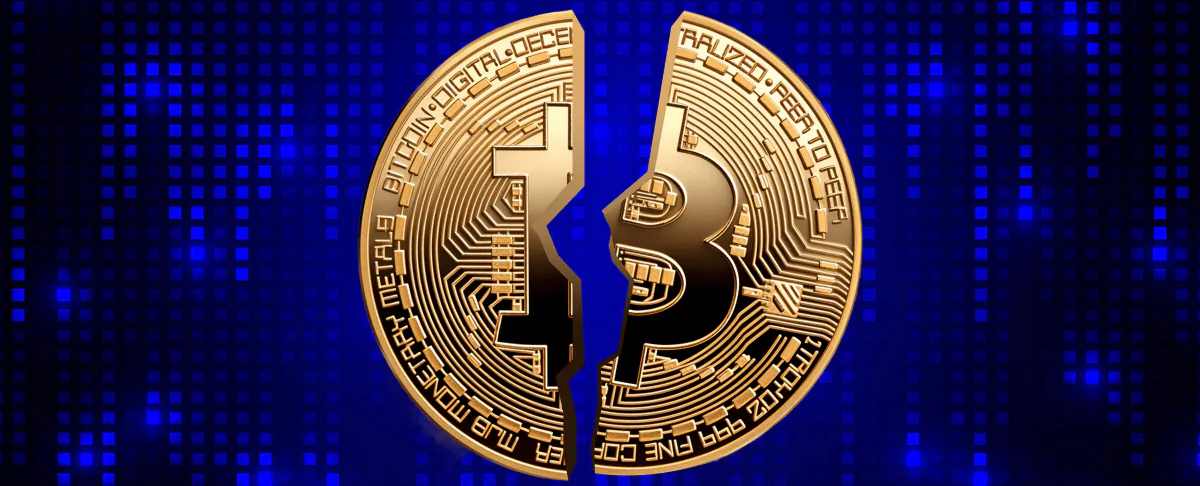As of July 2025, over 37 million unique cryptocurrencies had been created. This suggests that the cryptocurrency market is overheated.
03.05.2024

A hard fork in the realm of cryptocurrency denotes a notable shift in the underlying blockchain protocol, resulting in a split between the original and upgraded software iterations. This division spawns two separate blockchains, each governed by its unique set of rules. As a result, users are confronted with the choice of sticking with the old software or adopting the new version.
What breeds the different strains of hard forks, and how do they unfold?
There are generally two strains: orchestrated and spontaneous. Orchestrated forks are meticulously orchestrated by cryptocurrency stakeholders to refine functionalities, patch glitches, or tweak consensus rules. These enhancements might involve enlarging block capacities, adjusting mining algorithms, or implementing other substantial revisions. On the flip side, impromptu forks might sprout from internal strife or developer conflicts, fracturing the community and birthing an offshoot blockchain, possibly ushering in a new cryptocurrency era. Hard forks frequently ignite debates and discord within the cryptocurrency realm, potentially swaying market valuations and overall capitalization. Network participants must keep abreast of fork blueprints and deploy appropriate safeguards to shield their holdings.
Is it advisable to sell coins before a hard fork?
Deciding whether to divest your coins ahead of an impending hard fork demands a nuanced approach, considering various pivotal factors. Firstly, gauge the prevailing market sentiment: while anticipation of a hard fork might propel coin values upward in certain scenarios, investors might opt to offload holdings to hedge against potential uncertainties. Secondly, delve into the fundamental dynamics shaping the cryptocurrency landscape, including expectations surrounding upgrades or novel features linked to the impending fork. Tailor your decision to your overarching investment strategy: whether you lean towards a steadfast long-term approach or are swayed by short-term trading opportunities driven by market fluctuations. Moreover, don’t overlook the significance of portfolio diversification, as it can fortify your investments against unforeseen volatility. Ultimately, your choice to divest ahead of a hard fork should align with your investment objectives, risk appetite, and a thorough assessment of the prevailing circumstances.
How do hard forks affect cryptocurrency prices?
The repercussions of a hard fork on cryptocurrency valuations can wield considerable influence, yet it unfolds as a multifaceted and intricate phenomenon. Initially, investors may indulge in conjecture regarding the impending fork, spurring a surge in demand for coins as the blockchain schism looms, thus potentially triggering price escalations. Nevertheless, the specter of uncertainty encircling the hard fork could induce bouts of panic-driven selling, particularly if contentious issues surface.
Moreover, the hard fork process itself might encompass coin distribution, wherein investors stand to receive new coins based on their pre-fork holdings. Should the hard fork coincide with pivotal alterations or advancements to the protocol, it could allure fresh capital and kindle heightened enthusiasm for the project, conceivably resulting in price appreciation. Nonetheless, it’s imperative to acknowledge the capricious nature of the cryptocurrency market and its capricious response to hard forks.
Thorough research and consulting with seasoned practitioners are imperative for navigating such scenarios and crafting judicious investment strategies.
The Most Popular Cryptocurrency Hard Forks
In the world of cryptocurrencies, change is inevitable, and hard forks have become an integral part of this process. The blockchain’s history is punctuated with moments when society divided into different factions, each striving to pursue its own visions and ideals. In this article, we delve into the realm of the most popular cryptocurrency hard forks, examining their causes, consequences, and impact on the industry as a whole.
The Bitcoin Hard Fork
A Bitcoin hard fork is akin to a seismic event in the world of cryptocurrencies, stirring the entire industry and causing it to tremble. It’s not merely a technical upgrade or a protocol change; it’s a dramatic split at the core of the most renowned cryptocurrency. The ripple effect stemming from this division intertwines social, economic, and technical aspects, exerting profound influence over the entire cryptocurrency ecosystem.
An example of this epic saga is the split that occurred in 2017, leading to the creation of Bitcoin Cash. Stemming from disagreements within the community regarding network scalability and block size, this hard fork not only divided Bitcoin into two separate currencies but also sparked a wave of debates, passions, and financial movements. Ultimately, it marked the beginning of a new direction in the evolution of the cryptocurrency space.
A Bitcoin hard fork is not just a technical event; it reflects fundamental disagreements and aspirations within the cryptocurrency community. It tests the resilience and adaptability of the cryptocurrency idea itself. Each hard fork brings not only a new cryptocurrency but also a new chapter in the history of the cryptocurrency movement, learning from past mistakes and striving towards a better future.
The Ethereum Hard Fork
The Ethereum hard fork is akin to the climax in the drama of the cryptocurrency world, where every actor frets over their role, and the audience anticipates something thrilling. It’s a moment when Ethereum itself, seemingly unshakeable and innovative, faces the necessity of changes that will determine its fate. In a world where technologies evolve before our eyes and the stakes are high, the Ethereum hard fork becomes a stage for debates, strategic disagreements, and intrigue.
Consider, for instance, the Constantinople hard fork that unfolded in 2019. This episode was not merely a blockchain update but a battle for improving network performance and security. The decision on this hard fork came after hours of debate and collective efforts from community participants.
The Ethereum hard fork is not just a technical upgrade; it’s an expressive statement of the aspiration for improvement, the importance of decentralization, and readiness for change. Each hard fork becomes not only a step forward but also a new chapter in the saga of the cryptocurrency world, striving towards a more innovative future.
The Cardano Hard Fork
The Cardano hard fork is akin to a strategic pivot on the cryptocurrency map, evoking not only interest but also a myriad of questions about what the new chapter in the platform’s history may bring. It’s a moment when Cardano, with its ambitious goals of creating a robust and scalable blockchain infrastructure, enters a new phase of development, intertwining technical innovations with fundamental changes.
One of the most significant Cardano hard forks occurred in 2021 when the platform introduced the Goguen phase. This stage opened the doors for creating and executing smart contracts on the Cardano blockchain, attracting attention from developers and entrepreneurs worldwide. It wasn’t just a technical upgrade; it was a pivotal moment in the evolution of Cardano, confirming its ambitions to become one of the leading platforms in the blockchain world.
The Cardano hard fork is not just a technical event; it’s a testament to the project’s commitment to continuous development and innovation. It’s a moment when promises turn into reality, and dreams of a more efficient and resilient future begin to materialize. Each Cardano hard fork is a step forward in the quest to create a fairer and more decentralized world through blockchain technologies.
Distinguishing Between Soft Forks and Hard Forks
Hard forks and soft forks represent two distinct approaches to system upgrades, each with its own characteristics and implications. Imagine your software update could either be a drastic break or a smooth transition to a new version, and here’s how they differ:
Hard Fork:
- It's akin to transitioning onto a new, separate road in blockchain development, where each node must choose whether to follow the new route or stay on the old one.
- After a hard fork, the network splits into two separate versions, which can lead to community division and increased conflicts.
- This method requires active software updates from all network participants so they can continue operating on the new blockchain version.
- Example: The Bitcoin hard fork that led to the creation of Bitcoin Cash.
Soft Fork:
- It's more like a quiet update that allows the network to maintain unity while implementing changes to the protocol.
- After a soft fork, the network remains intact, and nodes that haven't upgraded can still operate but with limitations.
- This method is less disruptive and usually less controversial as it doesn't result in network split into two versions.
- Example: The implementation of SegWit in the Bitcoin network, which increased network throughput and made transactions more efficient.
Thus, hard forks and soft forks are not just technical terms but ways through which the cryptocurrency community can embrace changes and evolve.
Just a reminder that on Buycoin.online, you’ll discover a user-friendly platform for cryptocurrency exchange, offering a simple and swift way to conduct transactions with digital assets. The ability to exchange cryptocurrency is easily accessible thanks to our intuitive interface and convenient tools. Regardless of your experience in cryptocurrency, our site provides an easy and secure way to exchange digital assets. With a wide selection of supported cryptocurrency pairs and low fees, Buycoin.online is the perfect destination for those seeking a fast and reliable way to exchange cryptocurrency.




